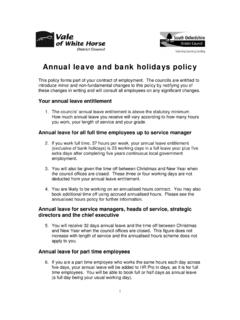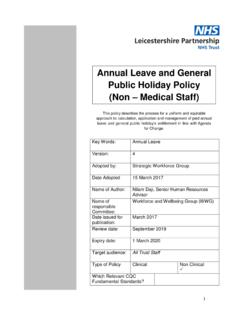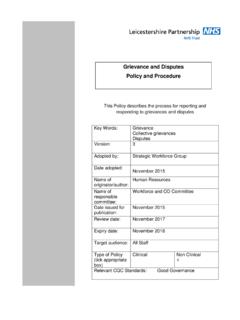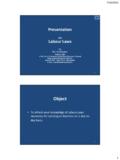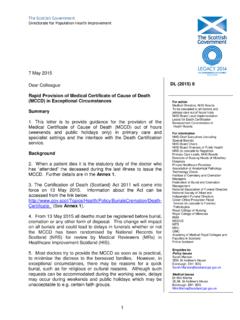Transcription of Human Resources Manual - Cilliers & Reynders …
1 Human Resources Manual Phatshoane Henney inc. 2008 w w w . c i l r e y n . c o . z a D i s c i p l i n a r y P o l i c y P h a t s hoan e He n n e y i n c . 2 0 0 8 P a g e 2 o f 28 phatshoanehenney 1. PURPOSE To apply consistent, fair and legal disciplinary procedures to ensure the maintenance of discipline at the workplace and the fair and equal treatment of all employees. 2. PRINCIPLES (i) To effectively regulate the interaction between the employer and employees in respect of discipline, to maintain discipline and to create awareness of disciplinary offences or transgressions. (ii) To ensure that any action is taken at the lowest possible level. (iii) To ensure fair, equal and consistent treatment of all employees. (iv) To facilitate upward and downward communication. 3. DISCIPLINARY policy AND PROCEDURE GENERAL For any misconduct at the employer s workplace and/or breaches of the employment policies, practices and procedures of the employer, this disciplinary policy shall be applied.
2 Employees have an obligation to maintain reasonable efficiency and standards of work and to further the employer s business interests, to be respectful and obedient to superiors and to generally refrain from misconduct. DEFINITIONS The following definitions are applicable to this policy , unless the context indicates otherwise: Appeal a process conducted by an independent senior manager or an external person with legal qualifications, to consider from the records of the disciplinary enquiry such grounds of dissatisfaction as raised by the employee or the employer in relation to the disciplinary hearing. CCMA means the Commissions for Conciliation Mediation and Arbitration. Conduct or misconduct In respect of an employee is interpreted to be the unauthorised and / or inappropriate action by the employee in contravention of the rules and regulations of this policy and or in breach of his/her contract of employment or any other policy and practice of the employer.
3 Day For the purpose of this policy , a normal working day excluding Sunday, Saturday and Public Holidays. Disciplinary hearing/enquiry A formal meeting, chaired by a manager of the employer or any of the company s subsidiaries or an external person with legal qualifications, conducted to obtain the relevant facts of the alleged misconduct, and to D i s c i p l i n a r y P o l i c y P h a t s hoan e He n n e y i n c . 2 0 0 8 P a g e 3 o f 28 phatshoanehenney take the necessary corrective action. Employee Representative A colleague or co-employee or trade Union official from a trade Union recognized by the employer. LRA The Labour Relations Act 55 of 1996. Management Includes employees from supervisory level upward for the purpose of discipline. DISCIPLINARY policy The employer supports the progressive approach to discipline expounded in the LRA and acknowledges that the primary purpose of disciplinary steps should be to correct the behaviour of employees as opposed to their punishment.
4 The employer also recognises all rights of employees in terms of the LRA and the Constitution of the Republic of South Africa. It is the employer s belief that a formal disciplinary procedure is essential for the efficient operation of its business, the fair and consistent treatment of all employees, and healthy industrial relations. To achieve this aim, the following principles must be observed: (i) Administering discipline, the promotion of stability and job security, and the just and equitable treatment of all employees, is the responsibility of Management. (ii) Management must employ a system of discipline focused on the correction of the employee s behaviour through informal counseling and/or warnings by his direct supervisor as a means to effective, prompt and expeditious application of discipline. (iii) Management will apply a formal disciplinary process in cases of grave disciplinary infractions/misconduct, or where informal counseling has been unsuccessful, or where there are repetitive acts of similar misconduct despite warnings given for such misconduct.
5 (iv) Management accepts that no employee will be disciplined without a fair hearing and an opportunity to clearly state his/her case, unless the employee in question waives this right by failing to attend such a hearing through his/her own choice. In such an instance, the hearing may proceed in his/her absence. (v) Clear evidence of a breach of the employer s rules, regulations, policies, and practices, or any legislation which the employer is statutorily bound to comply with, or any other prescripts in force at workplace must first be established before any dismissal can be entertained. (vi) Careful consideration must be given to the factual circumstances surrounding alleged misconduct before disciplinary action is taken. (vii) Management must reasonably strive to, with due regard to the circumstances of each case, be consistent in taking disciplinary action. D i s c i p l i n a r y P o l i c y P h a t s hoan e He n n e y i n c.
6 2 0 0 8 P a g e 4 o f 28 phatshoanehenney (viii) The contents of any document handed to the employee in terms of this disciplinary procedure must be explained to him/her. (ix) An employee against whom disciplinary action has been instituted in terms of the disciplinary procedure shall not be entitled to invoke the grievance procedure of the employer should he/she disagree with the disciplinary action taken by the employer. DISCIPLINARY PROCEDURE Scope of the disciplinary procedure This disciplinary procedure must be used for determining the guilt or innocence of an employee facing disciplinary charges. Representation and/or assistance of employees during disciplinary proceedings An employee is entitled to be represented by an Employee Representative at any formal disciplinary proceedings. Procedures regarding disciplinary offences If an employee is accused of a disciplinary offence, the employer must appoint an investigator to investigate the allegations against the employee.
7 The investigator must investigate the nature and extent of the alleged transgression by means of consultation with the employee and possible witnesses, and gather all relevant documentation and exhibits. Having assembled all documentary evidence and statements from the witnesses, the investigator must assess these and advise the employer of the appropriate steps to be followed, that is either a formal enquiry or an informal enquiry. If, after consultation (as described above) the investigator is of the opinion that the alleged misconduct does not warrant the institution of a formal disciplinary enquiry, the employer must: (i) explain to the employee the acceptable conduct required of him/her; (ii) explain the possible consequences of a repetition of the offences to him/her; (iii) provide counseling and or give a verbal or written warning depending on the seriousness and circumstances of the infraction committed; and (iv) a record of the corrective action taken must be kept by the Office Manager/HR Department in the personnel file of the employee.
8 D i s c i p l i n a r y P o l i c y P h a t s hoan e He n n e y i n c . 2 0 0 8 P a g e 5 o f 28 phatshoanehenney Notwithstanding the above, the employer may decide to refer any form of transgression for immediate formal disciplinary action if, in the opinion of Management the nature and/or seriousness of the offence justifies such action. In the case of serious or recurring offences the matter must be referred to formal disciplinary enquiry. If an alleged offence is referred for formal disciplinary action, a prosecutor/initiator (who may not necessarily be the investigator who investigated the alleged misconduct) will be appointed by the the employer. The prosecutor shall consider the available evidence, and conduct further investigations should such be deemed appropriate, and compile the charge sheet against the employee as well as a notice of a disciplinary enquiry. The notice of the disciplinary enquiry and the charge sheet must be presented in writing to the employee and the employee must sign an acknowledgement of receipt.
9 The written charge sheet must be served on the accused employee by means of personal service or by means of delivery at the last known residential address of the employee. The charge sheet must be accompanied by an explanation of the accused employee s rights regarding the disciplinary procedure. The accused employee has the following rights regarding the charges made against him/her: (i) The right to hear the charges and to receive them in writing. (ii) The right to object against the presiding official or the composition of the disciplinary panel. (iii) The right to call witnesses and to cross-examine all witnesses. (iv) The right to inspect any document presented as evidence. (v) The right to have his/her case concluded within a reasonable time. (vi) The right to have an interpreter present if necessary to translate the proceedings in a language that he/she understands. (vii) The right to be represented by an Employee Representative; (viii) The right to receive notice of a disciplinary hearing timeously (at least 48 hours before the convening of the disciplinary hearing).
10 (ix) The right to state his/her case and to defend him/ herself against the stated charges. (x) The right to an outcome (decision). D i s c i p l i n a r y P o l i c y P h a t s hoan e He n n e y i n c . 2 0 0 8 P a g e 6 o f 28 phatshoanehenney (xi) The right to only have his/her previous disciplinary record taken into consideration after guilt has been proven. (xii) The right to present mitigating circumstances before a decision is taken on a suitable disciplinary sanction. (xiii) The right to be informed of any disciplinary sanction. (xiv) The right to be informed of his/her statutory right to refer a dispute about the outcome of the hearing to the CCMA. (xv) The right to be protected against victimisation which may result from any statements and/or allegations or other actions during disciplinary investigation. The employer shall appoint a person, who need not be an employee of the employer, with or without legal qualification, to act as presiding official during the disciplinary investigation.
